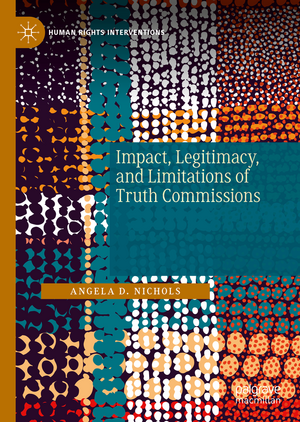Impact, Legitimacy, and Limitations of Truth Commissions: Human Rights Interventions
Autor Angela D. Nicholsen Limba Engleză Hardback – 22 feb 2019
Din seria Human Rights Interventions
- 15%
 Preț: 641.85 lei
Preț: 641.85 lei - 15%
 Preț: 650.69 lei
Preț: 650.69 lei - 15%
 Preț: 499.43 lei
Preț: 499.43 lei - 18%
 Preț: 730.16 lei
Preț: 730.16 lei -
 Preț: 453.21 lei
Preț: 453.21 lei - 18%
 Preț: 785.24 lei
Preț: 785.24 lei - 15%
 Preț: 475.80 lei
Preț: 475.80 lei - 15%
 Preț: 585.26 lei
Preț: 585.26 lei - 15%
 Preț: 589.14 lei
Preț: 589.14 lei - 15%
 Preț: 637.93 lei
Preț: 637.93 lei - 18%
 Preț: 777.69 lei
Preț: 777.69 lei - 18%
 Preț: 718.02 lei
Preț: 718.02 lei -
 Preț: 316.71 lei
Preț: 316.71 lei -
 Preț: 385.62 lei
Preț: 385.62 lei -
 Preț: 315.95 lei
Preț: 315.95 lei -
 Preț: 353.18 lei
Preț: 353.18 lei
Preț: 385.47 lei
Nou
Puncte Express: 578
Preț estimativ în valută:
73.77€ • 80.10$ • 61.97£
73.77€ • 80.10$ • 61.97£
Carte tipărită la comandă
Livrare economică 23 aprilie-07 mai
Preluare comenzi: 021 569.72.76
Specificații
ISBN-13: 9783030111717
ISBN-10: 3030111717
Pagini: 114
Ilustrații: XV, 106 p. 7 illus., 3 illus. in color.
Dimensiuni: 148 x 210 mm
Greutate: 0.35 kg
Ediția:1st ed. 2019
Editura: Springer International Publishing
Colecția Palgrave Pivot
Seria Human Rights Interventions
Locul publicării:Cham, Switzerland
ISBN-10: 3030111717
Pagini: 114
Ilustrații: XV, 106 p. 7 illus., 3 illus. in color.
Dimensiuni: 148 x 210 mm
Greutate: 0.35 kg
Ediția:1st ed. 2019
Editura: Springer International Publishing
Colecția Palgrave Pivot
Seria Human Rights Interventions
Locul publicării:Cham, Switzerland
Cuprins
1. Introduction.- 2. Mechanisms of Transitional Justice.- 3. Truth Commission Legitimacy.- 4. Measuring Truth Commission Characteristics.- 5. Truth Commission Legitimacy and Human Rights.- 6. Truth Commission Legitimacy and Violence in Africa.- 7. Conclusion.
Notă biografică
Angela D. Nichols is Assistant Professor in the Department of Political Science at Florida Atlantic University, USA. She has published work in the Journal of Conflict Resolution; International Studies Perspectives; Conflict, Security, & Development; and Civil Wars.
Textul de pe ultima copertă
“The study of transitional justice has moved beyond a normative understanding of impact driven by dichotomous understandings of implementation. Nichols’ book and dataset are important contributions to this new work. Advancing our knowledge of the legitimacy of truth commissions, her findings have important implications for how we study, and advocate for, transitional justice moving forward.”
—Cyanne E. Loyle, Indiana University, USA, and Peace Research Institute Oslo (PRIO), Norway
This book develops a theoretical understanding of how truth commissions achieve legitimacy and contribute to peace and stability. Angela D. Nichols argues that truth commissions are most likely to impact society when they possess certain institutional characteristics—characteristics that send important political signals to the state and broader society alike. If these signals suggest greater degrees of authority, a break with the past, and transparency in both its investigations and its findings, the truth commission is more likely to impact society. In particular, Nichols examines whether or not states that adopt truth commissions with these characteristics are more likely to respect human rights and experience lower levels of violence. She concludes with an analysis of Colombia’s newly established Truth, Coexistence, and Non-Recurrence Commission.
Angela D. Nichols is Assistant Professor in the Department of Political Science at Florida Atlantic University, USA. She has published work in the Journal of Conflict Resolution; International Studies Perspectives; Conflict, Security, & Development; and Civil Wars.
—Cyanne E. Loyle, Indiana University, USA, and Peace Research Institute Oslo (PRIO), Norway
This book develops a theoretical understanding of how truth commissions achieve legitimacy and contribute to peace and stability. Angela D. Nichols argues that truth commissions are most likely to impact society when they possess certain institutional characteristics—characteristics that send important political signals to the state and broader society alike. If these signals suggest greater degrees of authority, a break with the past, and transparency in both its investigations and its findings, the truth commission is more likely to impact society. In particular, Nichols examines whether or not states that adopt truth commissions with these characteristics are more likely to respect human rights and experience lower levels of violence. She concludes with an analysis of Colombia’s newly established Truth, Coexistence, and Non-Recurrence Commission.
Angela D. Nichols is Assistant Professor in the Department of Political Science at Florida Atlantic University, USA. She has published work in the Journal of Conflict Resolution; International Studies Perspectives; Conflict, Security, & Development; and Civil Wars.
Caracteristici
Makes a significant contribution to our understanding of how institutions of transitional justice are best able to serve individuals, states, and the international community Demonstrates that certain characteristics of truth commissions are necessary in order for those truth commissions to be impactful Uses a new dataset to identify and test three components of legitimacy - authority demonstrated by a strong mandate, a break with the past signaled by a new regime, and transparency via public hearings and published reports
